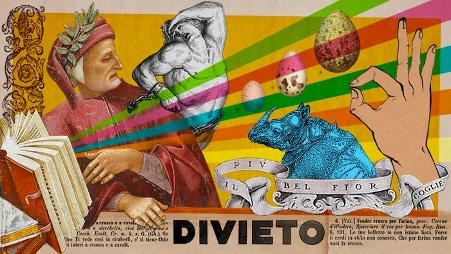
6 minute read
a scuola Italian and its limits: 8 things that the Italian language CANNOT do
by Alloranews
You can't chew gum! You cannot take photos here. You can't eat now! You can't dance. Ahhh! It's really frustrating and irritating to know that you CANNOT do something, isn't it? Yet, there are always limits to what we can do: they are the rules of society.
But did you know that this doesn't only apply to people but also to languages ? Oh yes… Even Italian has its limits…
Advertisement
I know, it's hard to accept… everyone has their own limits , even the Italian language! Below I leave you a list of all those things that the Italian language CANNOT do.
1. Make a distinction between "now" and a longer period of time through verbs:
Eg. I'm studying Italian … Yes, ok, but when ? In this precise moment or at this time?
Some languages use different verb forms to distinguish between “now, this moment” and a longer period of time (a week, a month, a year…). Italian, on the other hand, does not have this distinction: we will say "I'm studying Italian" both if we want to say that it is what we are doing right when we speak, and if we want to say that it is something we do "in this period ” (for a few months or weeks), but that we don't do it at the very moment we speak. Therefore, to understand if we are dealing with "now" or a slightly longer period, we need to help ourselves with adverbs or expressions of time, such as for example today , now, this afternoon, this morning, for a week, in last month, in this period, it's been a few days that …
2. Making a distinction between “process” and “result”
Some languages use different verb forms to best express what you want to focus on in conversation: i.e., is it more important the process or having completed an action ?
If I told you "Yesterday I read a book" , from my words you would not be able to understand at all which is the most important thing: the process of reading the book or the fact of completing the reading?
In other words, from that simple sentence it cannot be understood whether yesterday I simply spent some time reading a few pages or chapters of the
6. Distinguish between interrogative and affirmative sentences without relying on the tone of voice
In many languages, and I am not speaking only of English but also of a Romance language such as French, there is the interrogative form, which usually follows different grammatical rules compared to the affirmative and negative forms. In Italian… no! The only thing that makes our interlocutor understand that we are asking a question is our intonation.
book, or whether I have now read the entire book and finished my reading.
Again, to be clear we need to add more details .
3. Greet differently if you've just met or are about to leave
If I asked you what is the most common greeting in Italian, you would surely answer “Ciao!”.
For some foreign speakers, however, it is strange that in Italian there are no different ways to greet each other when you arrive and when you leave, as happens, for example, in English with the distinction between Hi and Bye.
4. Make a distinction between who hosts and who is hosted
If I tell you “Marta è la mia ospite”, am I saying that I host her in my house or that she hosts me in her house?
Good question, out of context, you really don't know! "Guest" , in fact, in Italian indicates both the person who is hosted and the person who hosts! In grammar, the phenomenon is called enantiosemy, and there are many other words that behave like this! You don't have to learn the grammatical name, but certainly knowing these words is important!
5. End words with a consonant
Every Italian word must end with a vowel (a – e – i – o – u). The only words in Italian that end with a consonant are those borrowed from foreign languages.
And yet, many foreigners will agree with me on the fact that many Italians, when pronouncing foreign words, "add a vowel sound", which Italians obviously do not hear because that pronunciation is "normal" for us.
For example, marketing will be pronounced by native Italian speakers as marketing-e.

“Let's eat a sandwich.” or “Shall we eat a sandwich?” It is different for the written form, in which it is possible to regulate through the punctuation marks: the point or the question mark.

7. Locate a region where "true" Italian is spoken
As you probably know, current Italian derives from the Florentine vernacular, the “language of Dante”. Florence 's influence on the Italian language remained strong for centuries, so much so that in the 19th century, Alessandro Manzoni wrote The Betrothed based on the Florentine dialect. He spoke of "rinsing clothes in the Arno", that is, "cleansing" his writing from the Lombard and French influences. However, from the unification of Italy onwards (1861), the importance of Florence and the Florentine area gradually decreased. So, today Italian is no longer really linked to Florence. It is now a very different language from North to South with all the regionalisms. Unlike what happens to French, for which the Parisian pronunciation is considered the standard one of the language, the Florentine pronunciation is no longer considered the most prestigious variety of Italian, just as no other is.

8. Express gender neutral
As it is possible to read in the Treccani Encyclopaedia, the neuter is a grammatical gender that was present in the Latin language alongside the masculine and feminine and was used to indicate inanimate objects and beings.
While some languages have maintained the use of the neuter (I am thinking of German for example), in Italian only the plural ending -a is conserved of some nouns, which were originally neuter plurals and today have become feminine plurals: “braccia, corna, mura, urla.” Recently, several linguistic scholars have been wondering about the possibility of introducing the neutral gender in Italian, but it hasn't happened yet and I honestly don't think it will. You think? Should it be included?
Allora! partecipa attivamente alla divulgazione della lingua e della cultura italiana all’estero, attraverso la pubblicazione di articoli e di periodiche attività didattiche. La rubrica “Ambasciatori di Lingua” si rinnova per fornire ai lettori delle nozioni sem-

NUOVE LEZIONI D’ITALIANO N. 12
plici, veloci e pratiche di base per imparare la lingua italiana.
L'italiano è una lingua con un ricchissimo vocabolario, espressioni idiomatiche e sfumature semantiche che riportiamo volentieri in queste pagine, con la speranza che al termine dell’an-
To the physicist Enrico Fermi

by Domenico Dimarte
no la comunità abbia appreso qualcosa in più sulla Bella Lingua e quanti sono ancora indecisi, si possano impegnare per conoscere più a fondo l’Italiano. La rubrica è realizzata in collaborazione con la Marco Polo - The Italian School of Sydney.
Almost seventy years gone by since that nasty bash to the Samurai… Nevertheless, it hasn’t taught us anything; we actually keep rehearsing that sin!
O Fermi, Fermi, what have you done?
We could have drowned all that energy from the sun. Since then the world Rules have worked a theme, irresponsible and obtuse to the extreme. Now that the planet is clouded with contamination some want to reverse the situation, blaming others all over the world for what they did surely will remain untold. They keep telling us lies all the time and with this dying world of continuing misinformation is a game. Does dangerous practice matter where it takes place? Isn’t that still part of this planet, we don’t realise? I would like to ask scientists a simple question, are those atomic tests the cause of global destabilization?
What is the effect, once released into the atmosphere? Aren’t atoms molecules, parts of the same matter?
Could it be the spark of global warming?
Or for this poor world is it like a refreshing dew of the morning?
Nevertheless they continue with experiments who cares what becomes of yours or my descendants? So irresponsible, yesterday, today and tomorrow for this disaster no one seems to feel any sorrow. The problem isn’t theirs nor the bombs, but it is to you and me; we have to save the planet by saving water and energy. Global warming isn’t caused by such experiments the problem is cows, goats, sheep, their emissions and excrements.
Ridiculous! Perhaps we are too many on this earth already and most probably, the Leaders secretly plan to decimate us, steady.
I’ll take such hypocritical jest as a big offence, disrespect to ordinary people intelligence! For generations they try to divert our mind as kept playing a game, now no one yet has the guts to accept the blame. The present Rulers should stop the never-ending hypocrisy come clean; for once accept responsibility. Today ordinary people no longer accept mockery what’s been going on, is it no longer a mystery. What inheritance to the future generation?
A choking planet, full of our irresponsible contamination?
O Fermi, Fermi, this is, really and truly, a mind blowing situation; you should’ve also invented how to reverse this macabre self-destruction!










